Celebrate Our Staff – September 2019
Here we celebrate our colleagues’ achievements across the University this past month.
Louise Bryant, who has been appointed a Professor in Psychological and Social Medicine, as well as becoming the first social scientist to be appointed to the UK National Screening Committee

Louise Bryant, from the Leeds Institute of Health Sciences, has been appointed a Professor in Psychological and Social Medicine, as well as becoming the first social scientist to be appointed to the UK National Screening Committee.
Professor Bryant has researched psychological and social aspects of prenatal screening for Down’s syndrome for more than 20 years, completing her PhD in this topic within the School of Psychology. Her work considers how parents make decisions about screening tests and the psychological factors and social influences on these decisions.
There are about 700,000 pregnancies in England every year, and every woman is currently offered prenatal screening for Down’s syndrome, Patau’s and Edwards’ syndromes, as part of their routine care. Professor Bryant has worked with healthcare providers and policymakers to ensure psychological and social evidence underpins professional education and the screening information that parents receive.
She currently chairs Public Health England’s Information and Education Working Group for the NHS implementation of Non-Invasive Prenatal Testing. This new non-invasive test has raised controversy and is widely discussed in the media. Working group members include advocates for people with the screened-for conditions and parent support organisations, to ensure the views of different stakeholders are listened to.
The UK National Screening Committee advises Government ministers and the NHS about all aspects of population screening, including implementation of programmes. The Screening Committee assesses evidence for screening programmes across all stages of life, including antenatal screening for HIV to bowel cancer screening for older age adults.
Professor Bryant said: “The recognition of the value of research evidence from the social sciences is an important milestone in the evolution of the Screening Committee and demonstrates the impact social scientists can make with their research.
“I am delighted the impact of my research, conducted over many years with excellent colleagues here at Leeds, has been recognised in my recent appointment as Professor in Psychological and Social Medicine.”
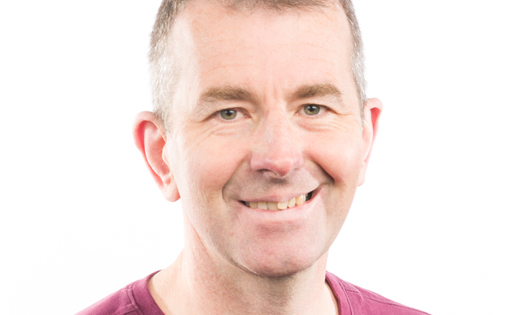
Professor Mark Mon-Williams, Chair in Cognitive Psychology at Leeds, has been appointed the University’s Academic Lead for the Wolfson Centre for Applied Health Research.
The Centre brings together researchers from the Universities of Leeds and Bradford with clinicians from Bradford Teaching Hospitals NHS Foundation Trust. It has been made possible thanks to a £1m award from national charity The Wolfson Foundation.
By combining the expertise of health researchers with clinicians who have daily contact with patients, the centre will ensure its findings are put rapidly into practice – resulting in better health and social care for those who need it most, right here in Yorkshire.
Professor Mon-Williams said: “I am absolutely delighted to have been appointed.
“It is a great privilege to represent the outstanding academics within the University, and to be part of a project that will create new and exciting opportunities for our researchers to contribute towards improving the physical and mental health of our communities.
“My role is to support all and any of our academics who would like to benefit from the world-class research infrastructure housed within the Wolfson Centre. Our goal is for the Wolfson Centre to allow our academics to expand the remit of their research across the Leeds City Region. We also hope some of our academics will take advantage of facilitated access to a number of internationally renowned studies within Bradford (e.g. Born in Bradford) so that their research expertise can be brought to bear on health problems affecting the city’s population.
“The Wolfson recognises that a regional ecosystem is required to tackle the poor health of the population, given the non-communicable disease epidemic we are experiencing. The creation of a facility that provides a space for our academics to interact with colleagues from the University of Bradford and the Bradford NHS Trust is an important first step in the development of the necessary ecosystem.”
Mark is also Professor of Psychology at the Bradford Institute of Health Research and Professor of Paediatric Vision at The Norwegian Centre for Vision, as well as a Turing Fellow at The Alan Turing Institute – the UK’s National data analytics centre.
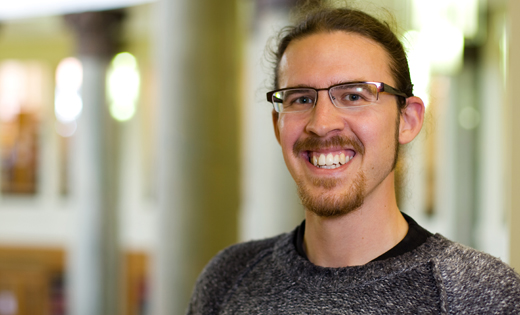
Dr Alaric Hall, Associate Professor in the School of English, has been appointed the new Director of the Institute for Medieval Studies (IMS), alongside a new Director of Postgraduate Research and Deputy Director.
Dr Hall will hold this role for a term of three years. The role of the previous Director, Professor Emilia Jamroziak, encompassed both the Director of the IMS and Director of IMS Postgraduate Research.
These posts will now oversee the running of the IMS:
- Director of the IMS – Dr Alaric Hall, Associate Professor in the School of English
- Director of IMS Postgraduate Research – Dr Melanie Brunner, Lecturer in Medieval Studies and Project Editor, International Medieval Bibliography (IMB); and
- Deputy Director of the IMS – Dr James Doherty, Teaching Fellow in Medieval History.
The duties of the Director of the IMS include working alongside the Director of the International Medieval Congress (IMC), Dr Axel Muller, and the Editor of the IMB, Dr Alan Murray.
Dr Hall described his role as “focusing on the teaching, supervising and primary research side of life in the Institute”.
Dr Brunner’s role entails managing PhD student queries and concerns, including responding to questions about supervision, transfers, vivas, extensions and more.
Dr Doherty’s role will focus on running the Medieval Studies MA.
Dr Hall is pleased to note he is “the first Director in a while to come from outside the Department of History – it’s nice to be reaffirming the IMS’s commitment to bring medievalist staff together from across the University”.
Describing the IMS as “a star in my firmament long before I actually began working here”, Dr Hall has attended the IMC since 2003, and one of his first published articles was accepted to Leeds Studies in English.
Dr Hall’s research focuses on Britain and Scandinavia from 500-1600, as well as modern Icelandic language and culture.
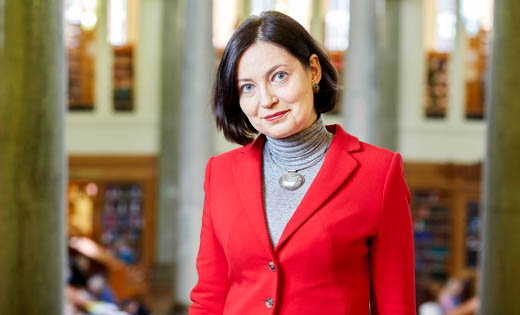
Emilia Jamroziak, Institute for Medieval Studies (IMS) Professor of Medieval Religious History, has started a year-long MWK-Fellows COFUND International Fellowship Programme for Experienced Researchers position at Erfurt in Germany.
Professor Jamroziak has been awarded a year-long fellowship for the project ‘The powerful afterlife of medieval monasticism – from the tyranny of origins, nationalism, modernisation paradigm to the transcultural perspectives’. The aim of the project is to explain key historiographical processes that the history of medieval monasticism has been subject to from the 19th century onwards.
The MWK-Fellows COFUND International Fellowship Programme for Experienced Researchers is co-financed by the European Union and sponsored by the Max Weber Centre for Advanced Cultural and Social Studies, based in Erfurt, Germany.
Professor Jamroziak described her ultimate aim as “to explore and dynamise theories of modernisation that are behind much of the past and current interpretations of monasticism – and medieval religious history more broadly”.
The project builds on Professor Jamroziak’s previous and current research, focusing on the interactions between religious institutions, especially Cistercian monasteries and the laity from the early 12th to the early 16th centuries.
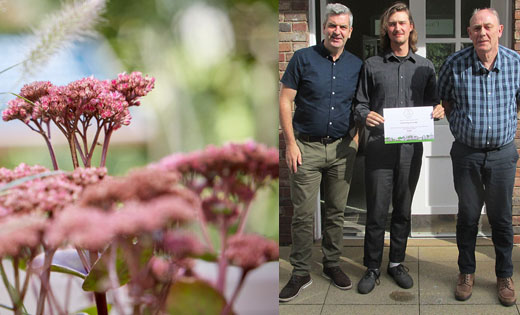 Bloomin’ marvellous! Ed Hicken, Head Gardener, Sam Robinson and Frank Dods with the Yorkshire in Bloom gold award for our beautiful grounds (above, left)
Bloomin’ marvellous! Ed Hicken, Head Gardener, Sam Robinson and Frank Dods with the Yorkshire in Bloom gold award for our beautiful grounds (above, left)
Our campus has been awarded a gold accolade for its outstanding grounds and gardens at this year’s Yorkshire in Bloom awards.
The prestigious honour signifies the comprehensive approach we take to incorporate sustainability, promote wildlife habitats and create a cohesive environment across the University. The success of the Living Lab projects incorporated with planting and pond schemes was also acknowledged, alongside our innovative approach towards biodiversity.
The judges said: “The campus was a pleasure to visit.
“All plantings are measured, using an innovative biodiversity standard to optimise any new landscape features during the planting stage. Successful examples are the maturing and very colourful Charles Morris garden, the Roger Stevens pond, the Laidlaw Library roof garden and the interactive sensory garden.
“The presence of a low maintenance urban wildlife garden with an apiary on site, located at the centre of campus, reinforces the University’s commitment to raising awareness and implementation of biodiversity considerations. An art trail, walking route and a significant level of interpretation encourage the casual visitor to explore what is a well-presented, clean and tidy campus.”
James Wright, Grounds and Gardens Team Leader, said: “We were delighted to receive this award – it’s incredibly rewarding to have our hard work and commitment acknowledged through Yorkshire in Bloom.
“We work closely with colleagues in Sustainability and Estates to ensure we create great spaces for bringing environmental benefits, as well as wellbeing benefits to all users of our campus.
“The Grounds and Gardens team is made up of colleagues with varied experience in this field. Indeed, we have been celebrating two of our colleagues – Sam Robinson, who has successfully completed his apprenticeship at the University and now has a full-time position within the team, and Frank Dods, our longest-serving member of the team, with more than 25 years at the University.
“It’s a real honour to celebrate this achievement with all the team, who collectively give so much each day to creating a well-presented and welcoming campus.”
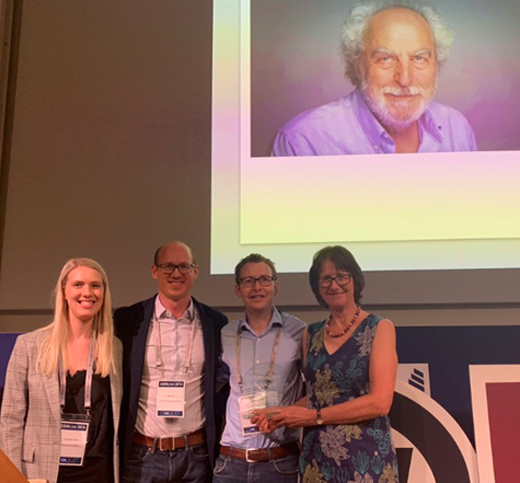 Receiving the inaugural Doug Altman Award at the EBMLive 2019 conference is Dr Stephen Bradley (second right)
Receiving the inaugural Doug Altman Award at the EBMLive 2019 conference is Dr Stephen Bradley (second right)
Dr Stephen Bradley, Clinical Research Fellow in Leeds Institute of Health Sciences, has received the inaugural Doug Altman Award at the EBMLive 2019 conference in Oxford.
The award is named after Doug Altman, who was the statistical editor of the British Medical Journal (BMJ) and a hero of the movement to improve the quality of medical research.
Dr Bradley’s presentation was a call to create and campaign for a small list of objectives to improve research quality.
Professor Richard Neal, Professor of Primary Care Oncology and Associate Director of the CanTest Collaborative, which funds Dr Bradley’s research, said: “Winning an award like this at a major international conference is a brilliant achievement for Stephen.
“The Doug Altman award is also a wonderful recognition of primary care research in Leeds and the role researchers like Stephen have, not only in producing high quality research but also in contributing to improving the wider landscape of scientific practice in general.”
Since winning the award, Dr Bradley has been working with colleagues he met at the conference to push forward with this idea and develop a collaboration to campaign for changes that can improve the openness and rigour of science.

Professor Nick Plant, Dean of Research Quality and Impact, and Professor of Systems Biology, has been elected to the board of the National Centre for the Replacement, Refinement & Reduction of Animals in Research (NC3Rs).
The NC3Rs is a UK-based scientific organisation that supports the commitment of the scientific community to the 3Rs by funding research and early career development, supporting open innovation and the commercialisation of 3Rs technologies, as well as simulating changes in policy, regulations and practice.
Professor Plant said: “The NC3Rs is making a vital contribution in the reshaping the when, how and why of animal use in scientific research.
“By championing the development of innovative approaches to monitor and improve animal welfare, as well as robust alternative methodologies, the NC3Rs is making a real difference to both animal welfare and the reproducibility of scientific research.
“I am looking forward to continuing my association with the NC3Rs, and working with other board members to support the NC3Rs in its important work.”
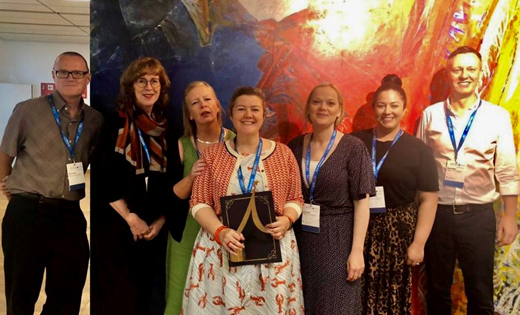
Congratulations to the Patient/Carer Community at Leeds Institute of Medical Education (LIME).
They have been awarded the international ASPIRE to Excellence Award for Inspirational Approaches to Health Professional Education in Patients as Educators, and are the first School in the world to hold this award.
The Medical School now holds six ASPIRE awards and remains top of the international leader-board.
This latest ASPIRE award recognises leading work delivered by the patient and public involvement team across multiple programmes. The trophy was collected at the Association for Medical Education in Europe (AMEE) conference in Vienna.
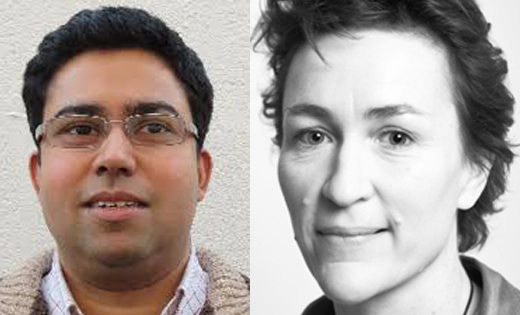
Professor Suraje Dessai and Dr Kate Lonsdale, from the Sustainability Research Institute (SRI) in the School of Earth and Environment (SEE), have been appointed Champions for the UK Climate Resilience Programme.
As thought leaders for the programme, the Champions play a number of roles, including identifying research gaps, synthesising research outputs and facilitating links across the research and user communities.
The four-year £18.6 million programme – led by UK Research and Innovation (UKRI) and the Met Office – will enhance the UK’s resilience to climate variability and change through interdisciplinary research and innovation on climate risk, adaptation and services, working with stakeholders and end-users to ensure the research is useful and usable.
Suraje Dessai has been Professor of Climate Change Adaptation at Leeds since 2012. His research and teaching focuses on the management of climate change uncertainties, perception of climate risks and the science-policy interface in climate change impacts, adaptation and services.
Dr Lonsdale has worked on adaptation to a changing climate as a researcher, trainer, facilitator and evaluator, and in an advisory capacity, for more than 24 years in both developed and developing country contexts. She also has 15 years of experience designing and facilitating participatory research processes, workshops and events.
The Champions will work alongside the Met Office delivery team, led by Professor Jason Lowe, from the Met Office and University of Leeds.
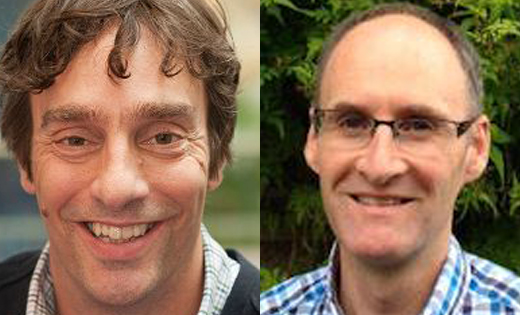
Professor Piers Forster and Professor Ken Carslaw have been elected as Fellows of the American Geophysical Union (AGU).
They received the honours in recognition of their visionary leadership, scientific excellence and exceptional research contributions to their respective fields.
The AGU is an international scientific association dedicated to advancing Earth and space science for the benefit of humanity. Its membership numbers tens of thousands, spanning more than a hundred countries.
Only 0.1% of AGU membership receives recognition through a Fellowship in any given year.
Professor Carslaw is a professor in the Institute for Climate and Atmospheric Science. His research improves our understanding of atmospheric aerosol particles and the effects they have on climate.
Professor Forster is a professor of climate physics and Director of the Priestley International Centre for Climate. He has played significant roles in authoring Intergovernmental Panel on Climate Change (IPCC) reports, as well as the recent pivotal Net Zero report from the UK Committee on Climate Change.
On the announcement of his Fellowship, he said: “It’s great to be receiving this honour, and getting it at the same time as Ken is the icing on the cake.”
He added: “The recognition is based mostly on publication record. Nearly all my papers have been collaborative efforts, working with esteemed colleagues from around the world, and with some exceptional PhD students and postdocs. As such, I owe a huge debt of thanks to these colleagues and friends.”
A celebration to honour this year’s Fellows will be held at the AGU Fall Meeting in December 2019.
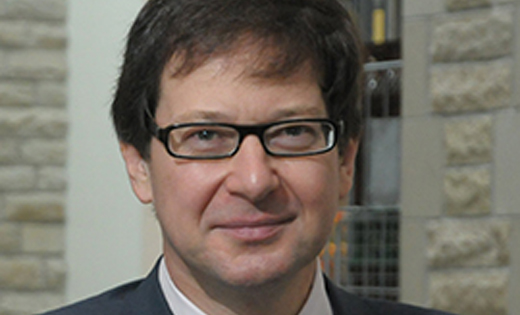
Professor Jeremy Clegg is to lead one of the world’s most prestigious business academies.
Professor Clegg, Jean Monnet Professor of European Integration and International Business Management at Leeds University Business School (LUBS), has been appointed President-elect of the Academy of International Business (AIB).
He will become AIB President in February 2020.
The AIB has a global membership of close to 3,500 scholars and specialists engaged in scientific research to advance public understanding and policy making with respect to international business.
Professor Clegg said: “I am honoured to have been asked to lead the Academy of International Business, which is preeminent in its field.
“The AIB is global in outlook, with members drawn from 94 countries, and leads the way in the creation and dissemination of new knowledge about international business and its impact on people. The world is going through a period of unprecedented change as the forces of globalisation and free trade – which have underpinned the global order and economic growth for decades – come under pressure. The AIB is ideally placed to help us understand what is happening, what may follow and how policymakers need to respond for the betterment of society.
“My appointment reflects the high esteem in which Leeds University Business School is held. The Centre for International Business University of Leeds (CIBUL) is the leading centre for international business in the UK, and among the top centres worldwide.”
Please contact Internal Communications if you or one of your colleagues would like to appear in this monthly feature. This is open to all staff – professional and academic.
Posted in: University news